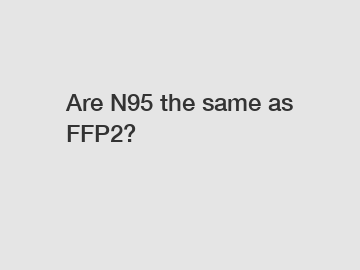Dec. 26, 2023
Security & Protection
Are N95 the Same as FFP2?
In the current global health crisis, there has been significant emphasis on the importance of personal protective equipment (PPE) such as masks in preventing the spread of infectious diseases. Two widely discussed types of masks are N95 and FFP2. While they share many similarities, it is crucial to understand whether they are truly the same or if there are any significant differences between the two. In this article, we will dive into the topic and explore the similarities and differences between N95 and FFP2 masks.
Understanding N95 Masks.

N95 masks are respiratory protective devices designed to achieve a very close facial fit and efficient filtration of airborne particles. They are widely used in healthcare settings to protect healthcare workers from respiratory infections. Created by the National Institute for Occupational Safety and Health (NIOSH), the N95 mask requires a minimum filtration efficiency of 95% for particles with a diameter of 0.3 microns or larger.
Exploring FFP2 Masks.
FFP2 masks, on the other hand, are European standard respiratory protective masks. FFP stands for "Filtering Face Piece," and the number indicates the filtration efficiency. FFP2 masks must achieve a minimum filtration efficiency of 94% for particles with a diameter of 0.6 microns or larger. Like N95 masks, FFP2 masks are commonly used in healthcare settings but are also utilized in industries where an individual may be exposed to harmful particles.
Similarities between N95 and FFP2 Masks.
N95 and FFP2 masks share several similarities. Both masks are designed to achieve a close facial fit and effectively filter airborne particles. They utilize a multi-layered filtration system that includes electrostatic charge to capture and trap particles. Moreover, both masks are considered high-level respiratory protective devices and are intended for single-use. They provide a certain level of protection against infectious diseases, including respiratory viruses.
Further reading:Differences between N95 and FFP2 Masks.
While N95 and FFP2 masks may seem similar, there are essential differences between the two. The primary difference lies in the standards used for their regulatory approvals. N95 masks are regulated by NIOSH in the United States, while FFP2 masks adhere to the European Union's EN 149 standard. These varying standards result in slight differences in filtration efficiency requirements and testing methods.
Another disparity lies in the fit testing protocols. The fit of a mask is critical as any gaps between the mask and the face may compromise its effectiveness. N95 masks require fit testing to ensure a proper seal, whereas FFP2 masks do not have a fit testing requirement. However, it is crucial to note that ensuring a tight fit is equally important for both types of masks.
Choosing the Right Mask.
Whether you should opt for an N95 or FFP2 mask largely depends on your geographic location and the guidelines provided by local health authorities. In regions where N95 masks are readily available and approved, they are often recommended for healthcare professionals. Conversely, in areas where FFP2 masks conform to the local regulations, they are considered a suitable choice.
In conclusion, while N95 and FFP2 masks share many similarities, they are not entirely the same due to differing regulatory standards and fit testing requirements. Nonetheless, both masks provide a high level of respiratory protection against harmful particles. To ensure the maximum effectiveness of any mask, it is essential to follow proper usage guidelines and fit testing protocols recommended by health authorities.
If you have any further queries or require more information, please do not hesitate to contact us.
*Contact us for any further inquiries or for more information.
Are you interested in learning more about cup shape protective face mask with valve, kn100 mask suppliers, kn100 mask supplier? Contact us today to secure an expert consultation!
Further reading:If you are interested in sending in a Guest Blogger Submission,welcome to write for us!
All Comments ( 0 )